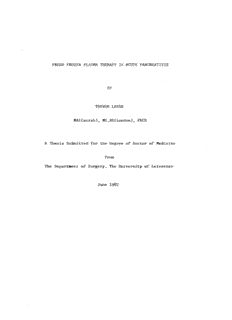Table Of ContentFRESH FROZEN PLASMA THERAPY IN ACUTE PANCREATITIS
BY
TREVOR LEESE
MA(Cantab), MB,BS(London), FRCS
A Thesis Submitted for the Degree of Doctor of Medicine
from
The Department of Surgery, The University of Leicester
June 1987
UMI Number: U010406
All rights reserved
INFORMATION TO ALL USERS
The quality of this reproduction is dependent upon the quality of the copy submitted.
In the unlikely event that the author did not send a complete manuscript
and there are missing pages, these will be noted. Also, if material had to be removed,
a note will indicate the deletion.
Disscrrlation Publishing
UMI U010406
Published by ProQuest LLC 2015. Copyright in the Dissertation held by the Author.
Microform Edition © ProQuest LLC.
All rights reserved. This work is protected against
unauthorized copying under Title 17, United States Code.
ProQuest LLC
789 East Eisenhower Parkway
P.O. Box 1346
Ann Arbor, Ml 48106-1346
The material which this dissertation is based
is my own independent work except where
acknowledged.
Trevor Leese
May 1987
To Brigitte and the boys
"That sweetbread gazing up at me
Is not what it purports to be...
Since it is neither sweet nor bread,
I think I’ll take a bun instead."
Ode to Sweetbread by Ogden Nash, 1953
CONTENTS
Page
Acknowledgements 6
Summary
Chapter 1 Acute Pancreatitis
Chapter 2 Protease Inhibitors with
specific reference to their role
in acute pancreatitis 78
Chapter 3 The scope of the present study 125
Chapter 4 An experimental model of acute
pancreatitis 132
Chapter 5 A system for continuous intravenous
infusion and body temperature
monitoring in the unrestrained rat 160
Chapter 6 Buprenorphine analgesia in the rat
model of acute pancreatitis 184
Chapter 7 Controlled trials of fresh frozen
plasma therapy in experimental acute
pancreatitis 198
Chapter 8 A multicentre prospective clinical
trial of fresh frozen plasma therapy
221
in acute pancreatitis
Chapter 9 Conclusions and prospects for
research 245
Appendix 248
Bibliography 255
ACK N OWL edgilmekt: '
I would like to acknowledge with gratitude the following in the
preparation of this thesis:
Trent Regional Health Authority who funded the study through a
Locally Organised Research Grant.
Dr. DB Morton and Mr. P.Husken of the Department of Anatomy.
University of Leicester^ for advice and help with the
experimental model of acute pancreatitis.
The late Mr. G.Fletcher and Mr. MA Squires of the Department of
Medical Physics, Leicester Royal Infirmary, for assistance
building the cages and infusion systems for the experimental
study.
The Department of Medical Illustration, Leicester Royal
Infirmary, for the photographic plates.
Dr. VE Mitchell, Mr. JA Revil, Mr. J O’Connor and Mrs. AR Mathers
of the Department of Haematology, Leicester Royal Infirmary, for
advice about the preparation of fresh frozen plasma and the blood
counts and clotting studies in the experimental model.
Dr. AF Winder and Dr.M.Holliday of the Department of Chemical -
Pathology, Leicester Royal Infirmary, for the serum biochemistry
in the animal model and the lactate dehydrogenase and
antiprotease measurements in the clinical trial.
Dr. KP West of the Department of Pathology, University of
Leicester, for the preparation and interpretation of histological
specimens.
The Consultant Surgeons at the five hospitals involved in the
clinical trial for allowing me to study patients under their
care, and their juniors for their co-operation.
Mrs. R.Aldwinckle for her patience during the typing of the
drafts of this thesis and Mr. DP Fossard, Mr. DFL Watkin and
Mr.AW Hall for their critical reading.
Finally, 1 would like to offer my grateful thanks to Professor
PRF Bell of the Department of Surgery, University of Leicester,
for making the research facilities fully available to me during
the course of this study and for his help and encouragement.
SUMMARY
Despite improvements in general supportative measures, the
mortality from acute pancreatitis in the United Kingdom still
approaches 10%. Although many specific therapies have been
proposed, none has consistently been shown to improve outcome in
controlled clinical trials.
Intravenous fresh.frozen plasma has been advocated as a
therapy for acute pancreatitis. It may supplement declining
natural antiprotease capacity, particularly alpha^ macroglobulin
which appears to have a central role in the elimination of
disseminated pancreatic enzymes in man.
Initially, the effect of fresh frozen plasma therapy on
survival in an experimental model of acute pancreatitis was
studied. A rat model of acute pancreatitis was established
including the facility for continuous intravenous infusion of
fluid. Intravenous therapy including fresh frozen plasma
significantly improved survival at 12 hours in the model when
compared with crystalloid (p<0.001) and colloid (p<0.01)
controls.
Subsequently a controlled clinical trial was performed
involving five hospitals over a twenty three month period. Two
hundred and two patients admitted with acute pancreatitis were
randomised to receive either low volume fresh frozen plasma
therapy (two units daily for three days) or colloid control. The
major serum antiproteases were measured during the course of the
disease.
There were no significant differences between the two groups
of patients in terms of clinical outcome. Serum alpha^
macroglobulin levels were reduced in both groups on day one and
continued to fall significantly from day one to day three in the
colloid control group (p<0.005) whilst remaining substantially
unaltered in patients receiving fresh frozen plasma (p = 0.6527).
The ability of relatively low volumes of fresh frozen plasma
to supplement declining alpha, macroglobulin levels in the early
stages of acute pancreatitis nas therapeutic implications. The
administration of larger volumes of fresh frozen plasma or alpha^
macroglobulin concentrates may improve clinical outcome.
Description:ACK N OWL edgilmekt:' I would like to acknowledge with . patients with chronic pancreatitis may have acute exacerbations but the condition may be

